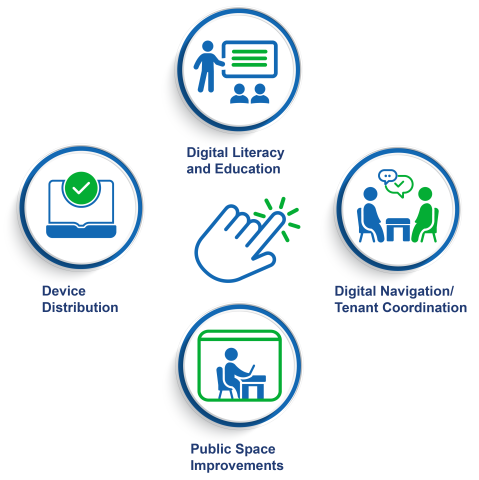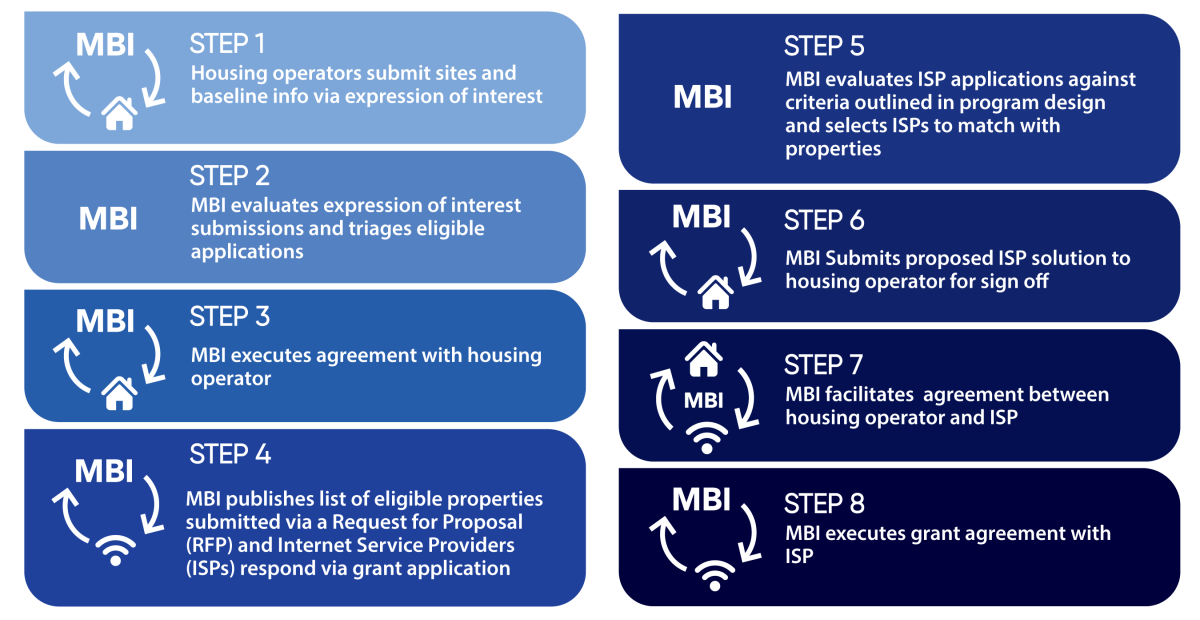Program Press Releases
Retrofit Ancillary Grantee (RANGE) program
Residential Retrofit housing operators are eligible to apply for additional funding for enhancements to strengthen internet access and adoption.

The Residential Retrofit Program deploys state-of-the-art broadband infrastructure to public and affordable housing properties across Massachusetts. MBI intends to increase low-income residents’ opportunities to access high-quality, reliable and affordable broadband service in their homes by addressing deficient wiring and infrastructure through grants for the deployment of fiberoptic cabling to the unit to qualified Internet Service Providers (ISPs) who will install, own and maintain equipment.
Improved infrastructure and enhanced connectivity will enable residents of public and affordable housing to engage in essential daily activities such as working remotely, pursuing educational opportunities and accessing telehealth.
The Residential Retrofit Program is funded by the U.S. Department of Treasury Capital Projects Fund (CPF) grant. MBI will make available grants covering 100% of the eligible capital costs associated with the retrofit of eligible properties.
Residential Retrofit Flyer (PDF)
If you have questions about the Residential Retrofit Program or would like more information, please contact MBI at broadband@masstech.org.
Rounds I-III Properties
The following map includes all properties engaged in Rounds I-III of the Residential Retrofit Program as of June 2025. Properties are coded by type: Public Housing Authorities, Non-Profit Developers or Community Development Corporations, Private For-Profit Developers, Supportive Housing, and Other. The map excludes Round IV Properties, which are currently undergoing solicitation.
Housing operators interested in applying to participate in the Retrofit Program can submit an expression of interest through our online form. MBI will collect some basic organizational information along with the addresses which the operator wishes to have considered eligible for the program.
MBI is coordinating this program with our existing Apartment WiFi program being run through the Metropolitan Area Planning Council. Your property may be eligible for both programs; however, a property may only be supported by one program.
It is highly recommended that operators submit as many properties as possible as MassTech will be looking at portfolio scale activities. At the same time, smaller operators that meet program eligibility requirements are encouraged to participate as well.
Preview Form Details (PDF)
On June 25, MBI hosted a webinar in partnership with the Massachusetts Union of Public Housing Tenants to provide an overview of the Residential Retrofit Program and benefits of participating.
Please contact broadband@masstech.org if you are interested in a meeting with the MBI Team.

Housing Operators that own and lease affordable housing and meet the following requirements are eligible to submit their properties for consideration under this program:
- State and federally funded public housing developments.
- Developments supported by Low Income Housing Tax Credits or other deed-restricted affordable housing developments.
- Housing developments that serve residents that fall at or below 300% of Federal Poverty Guidelines for household size or income at or below 65% of Annual Median Income (AMI) and households at or below 185% of Federal Poverty Guidelines for household size or income at or below 40% of AMI.
- Mixed income affordable housing developments will only be eligible if they are located in “Qualified Census Tracts” (QCTs).
- MBI will not invest in properties where less than 50% of the units are deed restricted affordable unless the property owner can provide sufficient information regarding the long-term affordability of the property and that residents meet U.S. Treasury definitions of “Impacted” or “Disproportionately Impacted”?
- MBI will not invest in properties where internal wiring upgrades have been made in the past five years or if there is fiber connectivity to the building and unit, or CAT 6 ethernet cabling to the unit.
MBI will validate affordability requirements via pre-defined data accessed from the Massachusetts Department of Housing and Livable Communities, U.S. Department of Housing and Urban Development, CoStar, Housing Navigator, and MassHousing.
MBI will validate wiring eligibility via the FCC’s Broadband Availability Map by ensuring Technology Provided at any given address does not include “Fiber to the premises” and will require awarded grantees to photographically document wiring conditions as a component of execution of work.
MBI will solicit grant applications through an open and competitive process from Internet Service Providers and other broadband infrastructure owners for fiber construction to eligible properties and in-building and in-unit installation of cabling and related equipment for properties submitted to MBI through the Expression of Interest form. See a list of potentially eligible properties here.
Grants will be made directly to Internet Service Providers (ISPs) for:
- Installation of fiber construction into affordable housing buildings;
- Installation of fiber or CAT 6 cabling into units within affordable housing buildings;
- Installation of smart panels or other needed in unit termination points for improved wiring within affordable housing buildings; and
- Other required cabling, RF or telecommunications equipment as required by individual building conditions within affordable housing buildings.
Click here for additional specific details of eligible and ineligible uses of funds – as defined by U.S. Treasury.
- A Request for Information (RFI) was posted on March 20, 2024 to collect information to a set of questions which will inform the structure of a formal procurement to award projects to qualified providers. The RFI closed on April 17, 2024.
- The first formal Request for Proposals (RFP) for this program was announced in Spring of 2024. Quarterly RFPs will be posted with updated eligible locations based on housing operators completing the Expression of Interest Form.
- Round II Request for Proposals (RFP) was posted September 16, 2024.
- Round III Request for Proposals (RFP) was posted February 4, 2025.
- Round IV Request for Proposals (RFP) was posted May 7, 2025.
- Round V Request for Proposals (RFP) was posted September 9, 2025.
MBI will update this webpage frequently with more details as we move through the processes.
Please sign up for the MBI Newsletter to stay up to date on program developments.
The dates outlined below are subject to change pending MBI’s program administration. All program activities under this grant program must be substantially completed by December 31, 2026. The federal interest period will continue through December 31, 2036.
| Milestone | Date |
|---|---|
| Release online Expression of Interest Form for property owners | February 2024 |
| Release Request for Information (RFI) to ISPs | March 20, 2024 |
| Release Round I Request for Proposals (RFP) and online application | May 2024 |
| Release Round II Request for Proposals (RFP) and online application | September 2024 |
| Release Round III Request for Proposals (RFP) and online application | February 2025 |
| Release Round IV Request for Proposals (RFP) and online application | May 2025 |
| Release Round V Request for Proposals (RFP) and online applications | September 2025 |
| Round I awards | August 2024 |
| Round II awards | January 2025 |
| Round III awards | April 2025 |
| Round IV awards | July 2025 |
| Round V awards | November 2025 |
After July 2024, MBI will update a listing of eligible properties submitted through the online Expression of Interest form on a bi-monthly basis and will publish RFP’s on a quarterly basis. Please check back to this website for ongoing updates.
Difference Between Apartment Wi-Fi and Residential Retrofit Programs
Apartment Wi-Fi:
- Wi-Fi Service Delivery: Shared among residents through a building-wide internet subscription.
- Management and Operation: Managed by the Metropolitan Area Planning Councils (MAPC) on behalf of the Massachusetts Broadband Institute (MBI).
- Funding Source: Funded via the American Rescue Plan Act (ARPA) State and Local Fiscal Recovery Funds (SLRF).
- Capital and Operating Expenses: MBI covers all capital costs (equipment, labor, etc) and operating expenses for the first year of service (ISP, MSP, and other associated costs).
Residential Retrofit:
- Internet Service Delivery: Delivered to individual units through a traditional unit by unit internet subscription plan, unless the building operator opts for a building-wide subscription.
- Management and Operation: Managed directly by MBI.
- Funding Source: Funded via the ARPA Capital Projects Fund (CPF).
- Capital Expenses: MBI covers only the capital expenses related to cabling to the unit. Operating expenses are not covered.
Apartment Wi-Fi:
- Initial Costs: Covered by MBI for both capital and operating expenses for the first year. Annual operating costs for a 100 unit building would be approximately $15k - $20k / year under a three year contract.
- Long-term Costs: Housing operators absorb operating expenses beyond the first year.
Residential Retrofit:
- Initial Costs: MBI covers the capital expenses related to the cabling construction to each unit.
- Long-term Costs: Ongoing subscription costs are not included in the grant award for the Retrofit program. Residents will not be required to subscribe to any newly established service unless the housing operator chooses to engage in a bulk service option directly with the ISP. MBI has structured the Retrofit RFP so that the housing operator will have full visibility as to both of these pricing structures (resident subscription and bulk service) to make an informed decision prior to ISP selection. If a housing operator chooses to enter into a bulk service agreement with an ISP that would cover internet service costs for all residents the housing operator will be required to cover those costs.
General Requirements for Both Programs:
- Eligible Developments: State and federally funded public housing developments, developments supported by Low Income Housing Tax Credits, or other deed-restricted affordable housing developments.
- Resident Income Levels: Housing developments serving residents at or below 300% of the Federal Poverty Guidelines or with incomes at or below 65% of the Annual Median Income.
Additional Requirements for Residential Retrofit:
- Investment Restrictions: MBI will not invest in properties where less than 50% of units are deed-restricted at/below 65% AMI. Properties where at least 50% of units but less than 100% of units are deed-restricted at/below 65% AMI will need to be located in a Qualified Census Tract (QCT).
- Wiring Standards: MBI will not invest in properties with recent internal wiring upgrades (within the past five years) or existing fiber connectivity to the unit.
